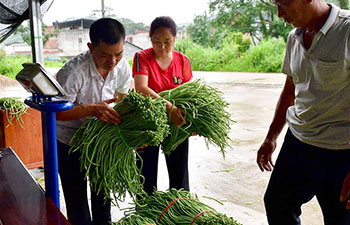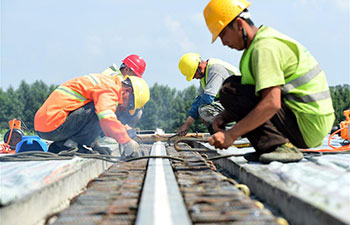
Bullet train G305 arrives at Baiyangdian Railway Station in Xiongan New Area, north China's Hebei Province, July 10, 2019. Carrying more than 1,100 passengers, the bullet train G305 departed Tianjin at 10:58 a.m. and will arrive at Hong Kong West Kowloon Station around 10 hours later, according to Tianjin's railway authorities. The 2,450 km-long route will run through several stations including Baiyangdian Station in the Xiongan New Area. A second-class seat for the 10-hour ride will cost 1,092.5 yuan (about 159 U.S. dollars). (Xinhua/Xing Guangli)
TIANJIN, July 10 (Xinhua) -- A direct high-speed train service was launched Wednesday between north China's Tianjin Municipality and Hong Kong.
Carrying more than 1,100 passengers, the bullet train G305 departed Tianjin at 10:58 a.m. and will arrive at Hong Kong West Kowloon Station around 10 hours later, according to Tianjin's railway authorities.
"The train tickets immediately sold out after the launch," said Ren Hongquan, deputy chief of Tianjin west railway station.
A second-class seat for the 10-hour ride costs 1,092.5 yuan (about 159 U.S. dollars).
"I took the train to visit my relatives in Hong Kong. Punctuality and a cheaper ticket price are the reasons why I chose it rather than taking a flight," said passenger Ma Chang.
The 2,450 km-long route will run through several stations including Baiyangdian Station in the Xiongan New Area, a new economic zone in Hebei Province, about 100 km southwest of Beijing.
Baiyangdian Station is an important transport hub between Xiongan and other regions of the country. The railway station has handled around 1.3 million passengers since it was put into use in December 2015.
The direct high-speed train service between Tianjin and Hong Kong is part of a new national train diagram starting Wednesday. Under the diagram, a new batch of high-speed trains will be put into use, and several stops will be adjusted to optimize the country's passenger transport services.
The service can boost the development of Xiongan and the Guangdong-Hong Kong-Macao Greater Bay Area, according to the China Railway Beijing Group.















